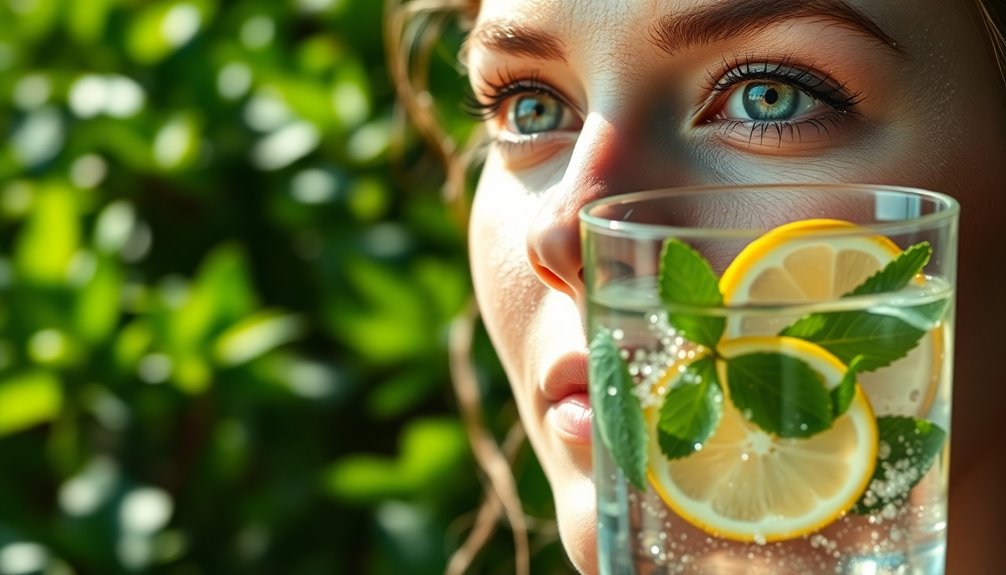Hydration plays a vital role in maintaining glowing skin. When you drink enough water, you support skin elasticity, collagen production, and cell turnover, all essential for a vibrant complexion. Dehydrated skin can lead to dryness, dullness, and premature signs of aging, like fine lines and wrinkles. To guarantee adequate hydration, aim for at least eight 8-ounce glasses of water daily, adjusting for your individual needs. Incorporating hydrating foods, like cucumbers and watermelon, can enhance your moisture intake. Staying mindful of signs of dehydration will help you maintain your skin's health and appearance. Discover additional insights to enrich your skin care routine.
Key Takeaways
- Proper hydration enhances skin elasticity, texture, and promotes a youthful, glowing complexion.
- Dehydrated skin appears dull, flaky, and is more prone to fine lines and wrinkles.
- Drinking adequate water aids in toxin removal, reducing inflammation and promoting clear skin.
- Incorporating hydrating foods like fruits and vegetables supports overall hydration and skin health.
- A consistent hydration routine elevates skin quality, aiding collagen production and maintaining a strong barrier against environmental stressors.
Importance of Hydration for Skin
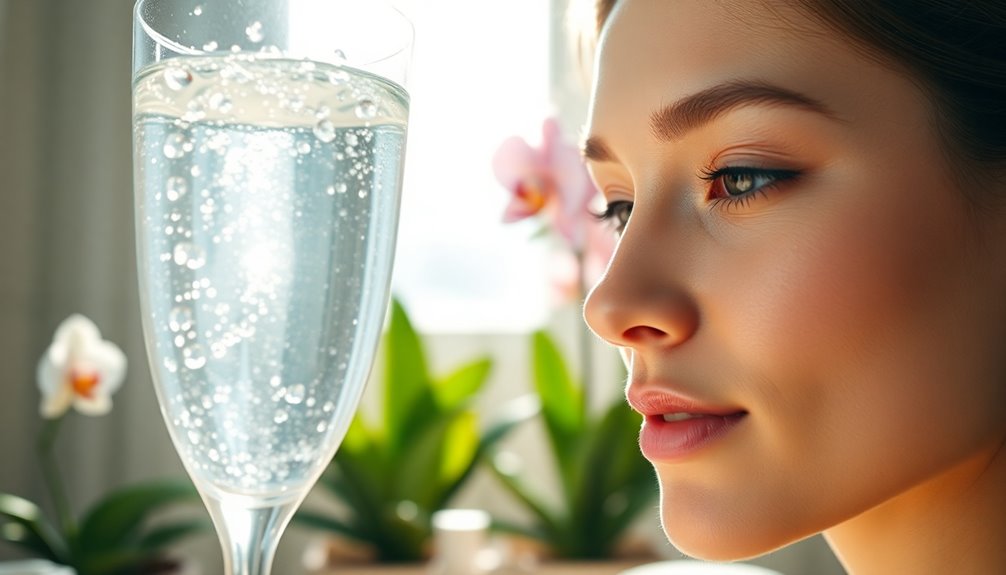
Hydration plays a crucial role in maintaining skin health, and numerous studies support its significance. When you consider skin hydration levels, it becomes clear that proper hydration contributes to the skin's elasticity, texture, and overall appearance. Dehydrated skin can lead to issues like dryness, flakiness, and a dull complexion, which nobody wants.
Water intake recommendations often suggest that adults drink at least eight 8-ounce glasses of water daily, but individual needs can vary based on factors like age, activity level, and climate. You might find it beneficial to monitor your water intake and adjust accordingly.
For instance, if you're active or live in a hot environment, your body may require more fluids to maintain peak hydration levels.
Research indicates that even mild dehydration can negatively impact skin health. A study published in the "Journal of Cosmetic Dermatology" demonstrated that increased water intake improved skin hydration and elasticity. This evidence underscores the importance of being mindful of your water consumption. Additionally, staying hydrated may support your body's overall health, including nerve health, which can enhance your well-being and comfort levels as you age, particularly in maintaining healthy nerves.
Incorporating hydration into your daily routine can be simple and rewarding. Keep a water bottle on hand, set reminders to drink throughout the day, or infuse your water with fruits for added flavor. By prioritizing your hydration, you're not just supporting your skin; you're fostering a sense of well-being that enhances your overall health. Remember, glowing skin starts from within, and staying hydrated is an essential step toward achieving that radiant complexion you desire.
How Water Affects Skin Health
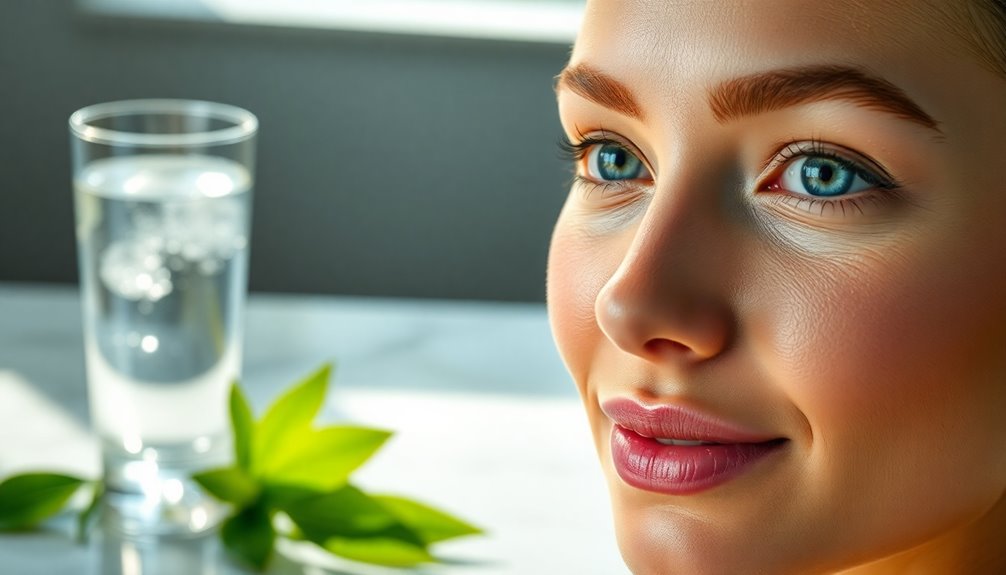
Your skin's health is intricately linked to water consumption, as it directly influences moisture levels and overall functionality. When you maintain ideal hydration levels, your skin can better perform its protective barrier function, preventing external irritants from causing damage. This balance not only helps in maintaining a youthful appearance but also supports skin cell turnover, which is essential for a radiant look.
Here are some specific ways water affects your skin health:
- Enhanced Elasticity: Sufficient hydration keeps your skin plump and elastic, reducing the appearance of fine lines and wrinkles.
- Improved Complexion: Well-moisturized skin tends to have a smoother and more even texture, contributing to a healthy glow.
- Detoxification: Drinking enough water aids in flushing out toxins, which can otherwise lead to blemishes and dullness.
- Reduced Inflammation: Proper hydration can help mitigate skin conditions like redness and irritation, promoting a more balanced skin appearance.
It's essential to recognize that hydration levels can fluctuate based on various factors, including diet, climate, and lifestyle. When you prioritize hydration, you're not just quenching your thirst; you're actively investing in your skin's long-term health and aesthetics. Additionally, maintaining hydration can complement your efforts in achieving optimal health benefits through programs like Adaptive Body Boost, which focus on overall well-being.
Remember that every sip contributes to not just your body's well-being, but also your skin's vitality. By making conscious choices about your water intake, you can foster an environment where your skin thrives, ultimately enhancing its overall appearance and resilience.
Signs of Dehydrated Skin
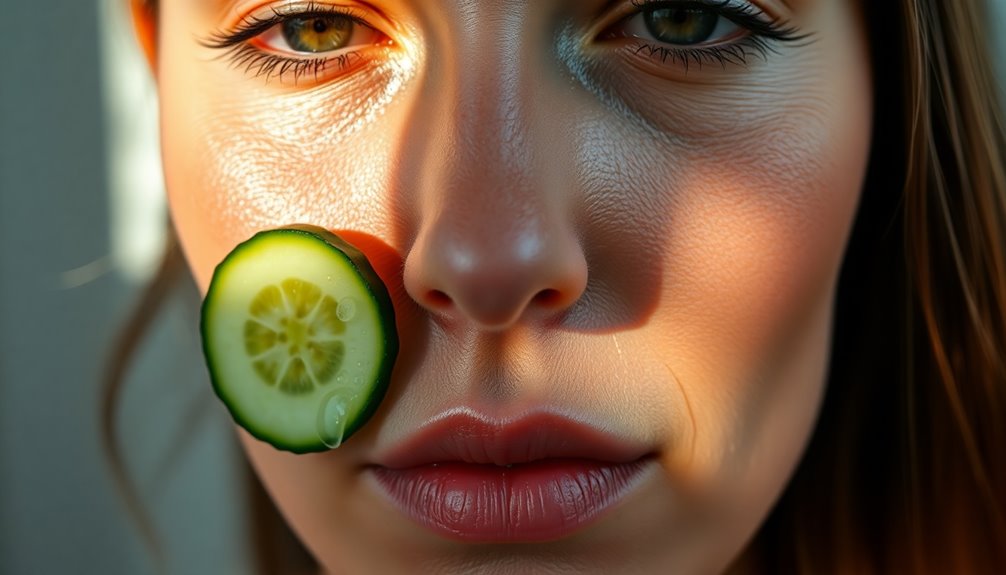
Recognizing the signs of dehydrated skin is vital for maintaining its health and appearance. When hydration levels drop, your skin can exhibit several warning signals that shouldn't be overlooked. One of the most noticeable signs is a lack of elasticity; your skin may feel tight or appear dull, indicating that it's not retaining sufficient skin moisture.
You might also notice increased dryness, which can manifest as flakiness or rough patches. This often occurs when environmental factors, such as cold weather or excessive sun exposure, strip your skin of its natural oils.
If your skin feels itchy or irritated, this could also be a sign of dehydration, as your skin's barrier function weakens when hydration levels are low.
Another indicator is the appearance of fine lines and wrinkles. Dehydrated skin tends to emphasize these signs of aging, making them more pronounced.
Additionally, if you find that your makeup doesn't apply smoothly or looks patchy, this could be due to insufficient skin moisture, making it vital to address your hydration needs.
Lastly, observe how your skin reacts to topical products. If you experience stinging or burning sensations upon application, it may be a red flag that your skin is dehydrated.
To achieve a radiant complexion, it's important to monitor these signs and take proactive steps to restore your skin's hydration levels, ensuring it remains supple and healthy. Moreover, just as a sleeping nerve in the foot can affect balance and stability, neglecting hydration can compromise your skin's overall health and vitality.
Hydration and Skin Elasticity
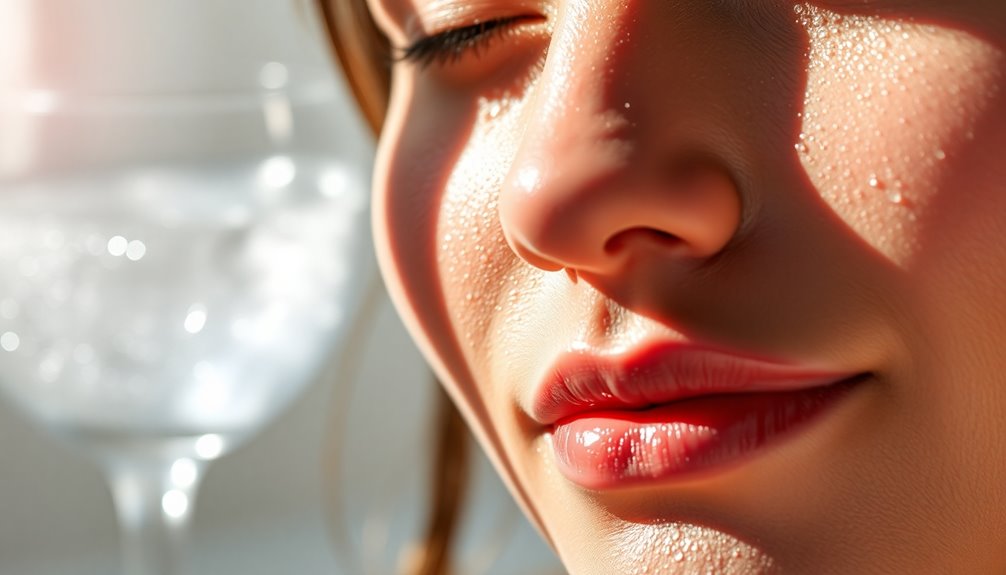
Maintaining adequate moisture levels in the skin is crucial for preserving its elasticity, a key factor in achieving a youthful appearance. When your skin hydration levels are at its best, your skin can stretch and bounce back effectively, preventing sagging and wrinkles. Conversely, when hydration levels drop, you may notice a decrease in elasticity, leading to dryness and an aged appearance.
To understand the relationship between elasticity and hydration, consider the following factors:
- Collagen Production: Proper hydration supports collagen synthesis, essential for maintaining skin's structure.
- Skin Barrier Function: Well-hydrated skin retains moisture better, helping to protect against environmental stressors that can impair elasticity.
- Cell Turnover: Adequate hydration promotes healthy cell turnover, which is optimal for a fresh and youthful complexion.
- Inflammation Reduction: Hydrated skin is less prone to inflammation, which can further damage elasticity over time.
Research indicates that when skin hydration levels are compromised, the skin loses its ability to maintain firmness and suppleness. This results in visible signs of aging, such as fine lines and decreased elasticity. By prioritizing hydration, you not only enhance your skin's appearance but also support its overall health. Additionally, embracing natural calorie cycles can contribute to your skin's hydration by promoting overall wellness.
Incorporating hydration into your daily routine can lead to lasting benefits. Remember, investing in your skin's hydration levels isn't just about aesthetics—it's about nurturing your skin for the long term. When you take these steps, you'll foster a sense of belonging to a community that values radiant, healthy skin.
Tips for Staying Hydrated
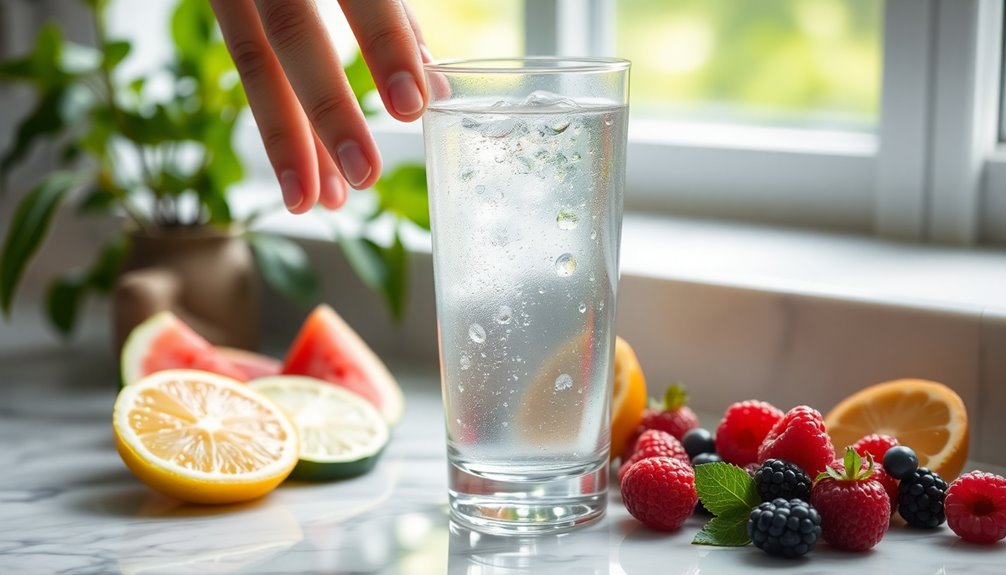
Staying hydrated is essential for achieving and maintaining glowing skin, and there are several effective strategies to guarantee you meet your hydration needs.
First, establish consistent hydration habits by setting specific goals for your water intake. Aim for at least eight 8-ounce glasses of water each day, but remember that individual needs can vary based on factors like activity level and climate. Keeping a water bottle nearby can serve as a visual reminder to drink regularly throughout the day.
Incorporating hydration into your routine can also be beneficial. Try drinking a glass of water first thing in the morning; this jumpstarts your metabolism and rehydrates your body after hours of sleep. Additionally, consider setting reminders on your phone or using apps designed to track water intake. These tools can help you stay accountable and make hydration a priority.
Don't forget to listen to your body. Pay attention to signs of dehydration, such as dry skin or fatigue, and adjust your water intake accordingly. Incorporating herbal teas or infused water can add variety and make the process more enjoyable.
Lastly, consider the timing of your water consumption. Drinking water before meals can help with digestion and keep you feeling full, potentially reducing the likelihood of overeating. By adopting these practical tips and fostering healthy hydration habits, you'll not only support your skin's health but also contribute to your overall well-being. Additionally, proper hydration can enhance the body's ability to manage blood sugar levels, which is crucial for overall health. So, make hydration a cornerstone of your daily routine, and watch as your skin transforms.
Foods That Boost Hydration
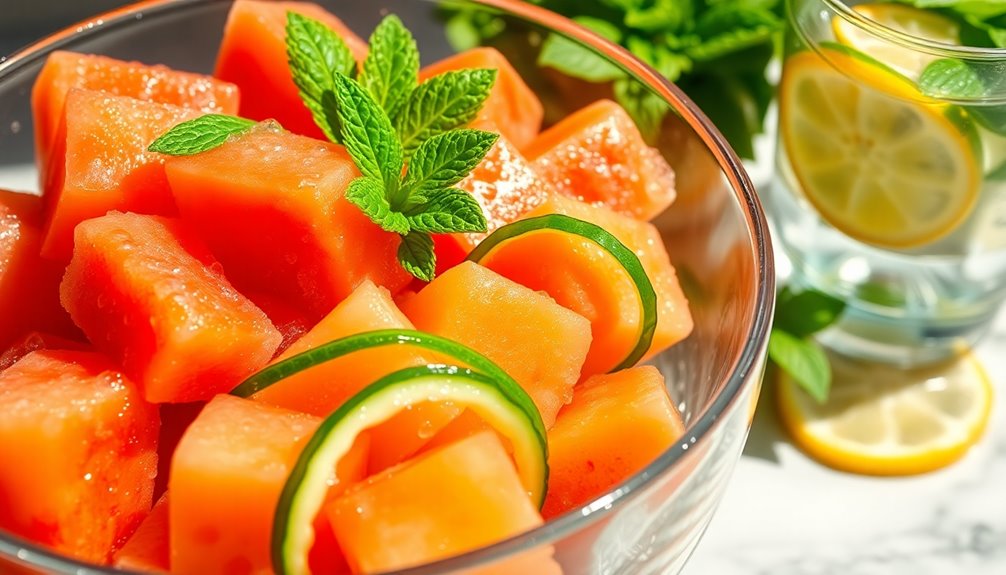
Including hydrating foods in your diet can greatly enhance your overall hydration levels and support vibrant skin. While drinking water is essential, complementing your intake with hydrating fruits and water-rich vegetables can provide additional benefits. These foods not only help maintain hydration but also deliver essential vitamins and minerals that promote skin health.
Here are some top choices to ponder:
- Cucumbers: With approximately 95% water content, cucumbers are perfect for hydration and can be easily added to salads or enjoyed as a revitalizing snack.
- Watermelon: This hydrating fruit isn't only delicious but also contains vitamins A and C, which are important for skin repair and rejuvenation.
- Oranges: Packed with vitamin C, oranges help boost collagen production, enhancing skin elasticity while providing significant hydration due to their high water content.
- Spinach: As a water-rich vegetable, spinach is loaded with antioxidants and can be easily blended into smoothies or added to meals for a nutritional boost.
Incorporating these hydrating foods into your daily meals can help you achieve and maintain that sought-after glow. They're not only enjoyable but also foster a sense of community when shared with friends or family at gatherings. By prioritizing these hydrating choices, you're taking a proactive step towards better hydration and radiant skin. Remember, every small change contributes to your overall wellness and beauty. Additionally, a plant-based diet rich in fruits and vegetables can significantly enhance skin health by providing essential nutrients and antioxidants.
Frequently Asked Questions
Can I Hydrate My Skin Through Topical Products Alone?
You can't rely solely on topical products for hydration. While they can improve your skin barrier and offer some moisture, internal hydration is crucial. Drinking enough water supports your overall skin health from within, ensuring your skin remains plump and radiant. Topical products can complement this, but they're not a substitute.
For best results, combine both approaches—hydrate internally and use effective creams to enhance your skin's appearance. Your skin will thank you!
Does Alcohol Consumption Affect Skin Hydration Levels?
Alcohol consumption can greatly impact your skin's hydration levels. When you drink alcohol, it often leads to dehydration, which can undermine the effectiveness of your topical hydration products.
While these products can provide temporary moisture, they can't fully counteract the drying effects of alcohol. To maintain healthy, hydrated skin, balancing your alcohol intake with sufficient water consumption and proper skincare routines that prioritize both internal and external hydration is crucial.
How Does Climate Impact My Skin's Hydration Needs?
Just like a plant needs the right amount of water, your skin thrives on proper hydration based on climate. In high humidity, your skin retains moisture more easily, but in dry climates, it loses hydration quickly. Sun exposure further dehydrates your skin, so you'll need to adjust your hydration routine accordingly.
Keeping an eye on humidity levels helps you understand your skin's needs, ensuring it stays healthy and radiant, no matter the conditions.
Are There Specific Hydration Routines for Different Skin Types?
Yes, there are specific hydration routines customized for various skin types. If you have oily skin, lightweight, non-greasy moisturizers can assist in balancing hydration without blocking pores.
On the other hand, for dry skin, you'll find value in richer creams that seal in moisture. Adding serums with hyaluronic acid can also boost hydration for both skin types.
Adjusting your routine according to your skin's sensations and responses is crucial for maintaining the best possible hydration and health.
Can I Overhydrate My Skin, and What Happens if I Do?
Overhydrating your skin can be like pouring water into a sponge that's already soaked—it just can't absorb anymore. The potential consequences include puffiness, irritation, and even breakouts.
You might notice signs of overhydration such as excessive oiliness, a tight sensation, or redness. Achieving the correct balance is crucial; your skin needs hydration but also requires the ability to breathe.
Finding that equilibrium can lead to healthier, happier skin overall.
Conclusion
In today's fast-paced world, staying hydrated is as essential to your skin as charging your smartphone is to keep it functioning. By prioritizing hydration, you not only prevent signs of dehydration but also enhance your skin's elasticity and overall health. Incorporating water-rich foods into your diet can further boost your hydration levels. So, make a conscious effort to drink enough water daily; your glowing skin will thank you for it as you step into the spotlight.

